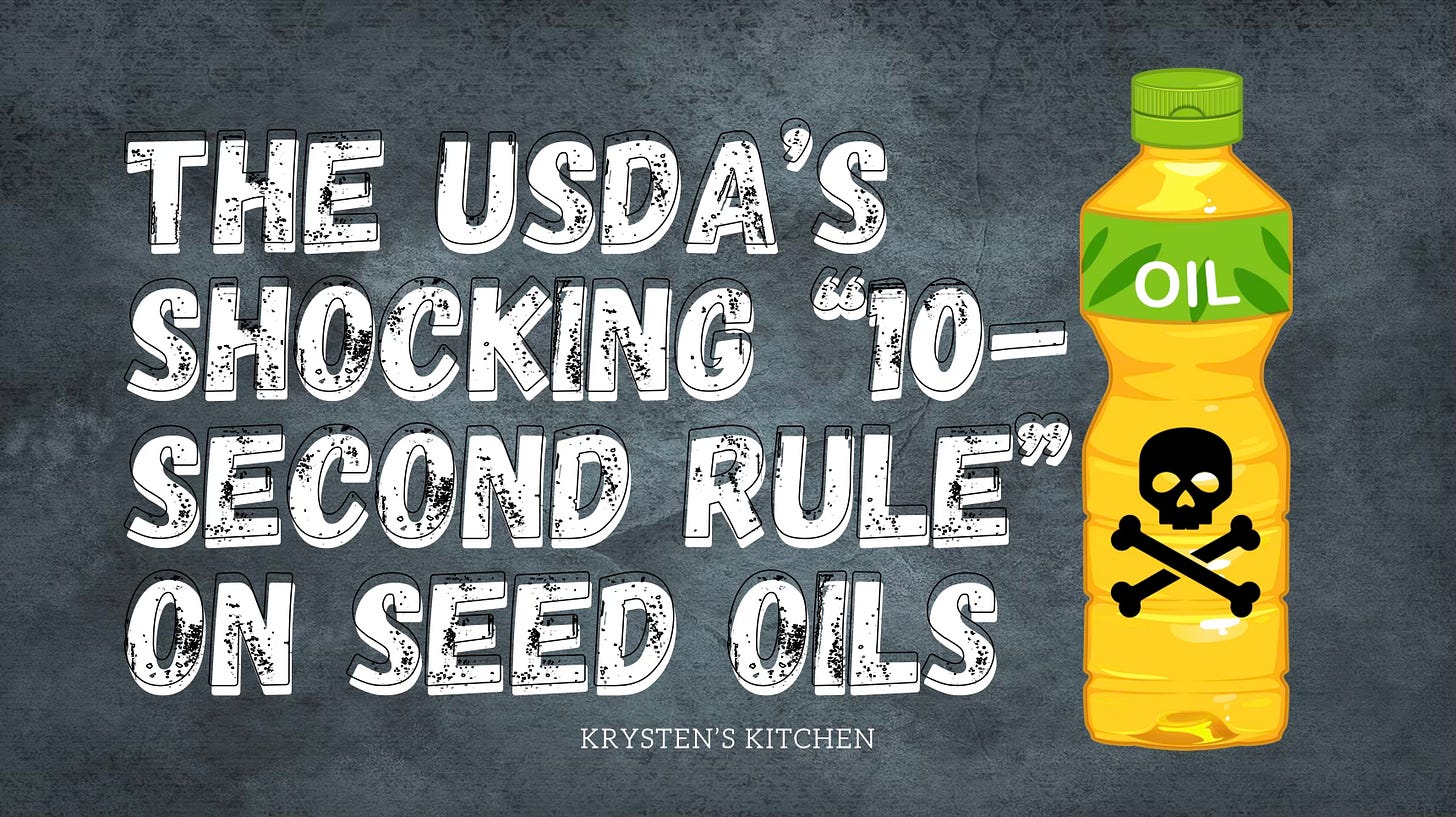Buckle up, friends because this is the kind of food industry nonsense that really gets me fired up. Let’s talk about the USDA’s “10-second rule”—a shady little loophole that lets companies fry food in seed oils without having to tell you.
Perdue recently confirmed in a letter that their breaded chicken products are flash-fried in soybean oil before being baked—but here’s the kicker: they don’t have to put that on the label. Say what?
According to the USDA, oil used in the frying process is considered an incidental additive (also known as: “it doesn’t reallllly count”), meaning it’s not required to be disclosed. So even though your food is literally fried in seed oils, they don’t have to list it as an ingredient. It’s like it never happened.
But it did happen.
For those of us who go out of our way to avoid seed oils like soybean, canola, etc., this is beyond frustrating. We are intentional, we read labels, we ask questions, we make informed choices—only to find out that companies are using regulatory loopholes to hide the full truth about their food.
Perdue admitted that every single breaded product they sell is fried in soybean oil. That means every time someone picks up their “healthy” or “organic” breaded chicken, thinking they’re making a better choice, they’re actually getting seed oils they never agreed to eat. And unless you call and ask, you’d never know.
And let’s not forget: soybean oil is one of the most inflammatory, highly processed oils out there. It’s been linked to everything from gut issues to hormone disruption, and yet, companies continue to drench their food in it because it’s cheap and easy.
To make matters worse, organic certification doesn’t even protect you from this. Even if a product is labeled “organic,” it can still be flash-fried in organic soybean oil without any disclosure. The USDA allows it, Perdue takes advantage of it, and the consumer is left completely in the dark.
The worst part? Some companies actually choose to disclose when their food is “set in oil” or “lightly fried,” but Perdue simply chooses not to. They know they don’t have to, so they don’t. This isn’t just about following the rules—it’s about companies intentionally keeping consumers uninformed. ZERO transparency.
This is exactly why so many people have lost trust in the food industry. The fact that companies can legally hide ingredients and processing methods just because they’re not technically required to disclose them is ridiculous. Food labeling should be about transparency—not about doing the bare minimum to stay compliant.
So what can we do? I’m glad you asked… that’s because you’re smart.
First, spread the word—because if enough people start talking about this, companies will realize they can’t keep getting away with it. Most people assume that if something isn’t on the ingredient list, it’s not in the food. Clearly, that’s not the case, and the only way to change things is to make people aware.
Second, ask questions. If you buy breaded products, call the company and ask if they use seed oils in their frying process. Don’t assume that just because it’s not listed, it’s not there. If you eat at a restaurant, ask if they have olive oil that isn’t cut with canola oil (wait… did you not know about that?) The more pressure we put on brands and companies the more likely they are to be transparent or change!
Third, support brands that are honest. There are companies out there that voluntarily disclose everything—even when they don’t have to. Those are the brands we should be supporting, not the ones that rely on loopholes to keep their customers in the dark.
Last… push for better labeling laws. The fact that seed oils can be used in food production without being listed on the label is unacceptable. This is an industry-wide issue, and unless consumers demand change, nothing will happen. Whether it’s signing petitions, reaching out to lawmakers, or simply refusing to buy from companies that refuse to be transparent, we have power in how we spend our money.
At the end of the day, this isn’t just about Perdue. It’s about a broken food system that allows companies to hide behind vague regulations instead of being honest about what’s actually in our food. The USDA is supposed to protect consumers, but instead, it’s making it easier for companies to mislead us.
If a product has been fried in soybean oil—even for just ten seconds—we have the right to know. It shouldn’t matter if the USDA says it’s “not an ingredient.” If it touched the food, if it absorbed into the food, if it changed the food, then it should be on the label. Period.
Should companies be required to disclose all cooking methods, even if an ingredient is just a “quick dip” away from disappearing on the label?
Thank you so much for being a paid subscriber of Krysten’s Kitchen and supporting my work. It means so much to me. I’m honored to serve you and your families! Please share this post with your friends and family to spread the word on all things health, wellness and occasional recipes.






